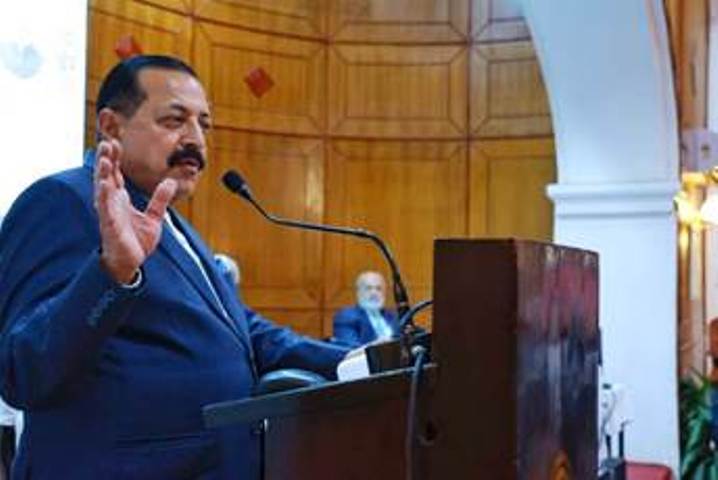India Pioneers Genomics Self-Reliance: Dr. Jitendra Singh Unveils Indigenous Genomic Data Set and Framework for Global Research
Dr. Singh announced an ambitious target of sequencing 10 million genomes, which will significantly accelerate India’s leadership in personalized medicine and genomics innovation.

- Country:
- India
Marking a transformative milestone in India’s journey toward self-reliance in genomics, Dr. Jitendra Singh, Union Minister of State (Independent Charge) for Science and Technology, announced the successful development of India’s indigenous genomic data set at the Genome India Data Conclave held at Vigyan Bhavan, New Delhi. Major Announcements and Achievements:
Launch of Indian Biological Data Centre (IBDC) and FeED Protocols:
The IBDC portal now hosts 10,000 whole genome sequencing (WGS) samples, representing diverse Indian populations.
The Framework for Exchange of Data Protocols (FeED) was unveiled, ensuring ethical, fair, and secure sharing of genomic data, aligning with the Biotech-PRIDE Guidelines introduced in 2021.
Key Genomic Breakthroughs:
India’s genomic data set will serve as a critical resource for medical and scientific research, supporting advancements in personalized medicine, genetic disorder treatments, mRNA vaccine development, and precision agriculture.
This achievement positions India to develop genomic tools and chips tailored to its unique demographic, enhancing the accuracy of genetic studies and healthcare outcomes.
Future Expansion Plans:
Dr. Singh announced an ambitious target of sequencing 10 million genomes, which will significantly accelerate India’s leadership in personalized medicine and genomics innovation.
Significance of the GenomeIndia Project
Dr. Singh emphasized the importance of the GenomeIndia Project, spearheaded by the Department of Biotechnology (DBT), in creating a robust database of India’s genetic diversity. He noted that this diversity, reflective of India’s cultural and geographical uniqueness, will catalyze breakthroughs in healthcare, agriculture, and environmental science.
Economic Impact and Bioeconomy Growth
Highlighting the rapid growth of India’s bioeconomy—from $10 billion in 2014 to $130 billion in 2024—Dr. Singh projected a rise to $300 billion by 2030. This growth is driven by a surge in biotech startups, which increased from 50 in 2014 to over 8,500 in 2023, as well as the introduction of the New Bioeconomy Policy under the leadership of Prime Minister Narendra Modi.
India’s achievements in biotech include:
Ranking 12th globally and 3rd in the Asia-Pacific region.
Being the largest vaccine producer and home to the third-largest startup ecosystem in the world.
Collaborative Efforts and Future Outlook
The conclave witnessed participation from prominent scientific leaders, including:
Dr. Rajesh S. Gokhale, Secretary of DBT, who highlighted the potential of genomic data to counter genetic and hereditary diseases.
Prof. Ajay Kumar Sood, Principal Scientific Adviser, emphasized the transformative role of genomic data in healthcare, agriculture, and industrial research.
Dr. Rajiv Bahl, Director General of ICMR, and other key officials, underscored the collective effort behind this initiative.
Prime Minister Modi’s Vision
In a video message, Prime Minister Narendra Modi congratulated the scientific community and outlined a roadmap for India’s future in genomics. He emphasized the importance of genomic data in empowering India through:
Pro-people governance.
Digital public infrastructure development.
Establishing a Genomic Data Bank as a global knowledge and innovation hub.
The PM highlighted the initiative as a pivotal step toward achieving Viksit Bharat @2047, where India emerges as a global leader in science, technology, and healthcare.
Strengthening Research Ecosystems
Dr. Jitendra Singh proposed collaborations with institutions like Tata Memorial Hospital to enhance data enrichment and expand the research ecosystem. These efforts aim to develop innovative solutions for genetic disorders, improve healthcare delivery, and create new opportunities for scientific discovery.
A Global Hub for Genomic Research
With the launch of indigenous genomic data and the ‘GenomeIndia’ project, India is poised to become a global hub for genomic research, driving the next wave of scientific and medical innovation. This initiative reinforces India’s vision for sustainable growth, scientific self-reliance, and global leadership in biotechnology.
- READ MORE ON:
- Dr. Jitendra Singh










